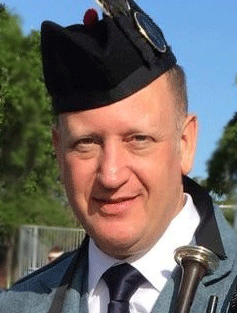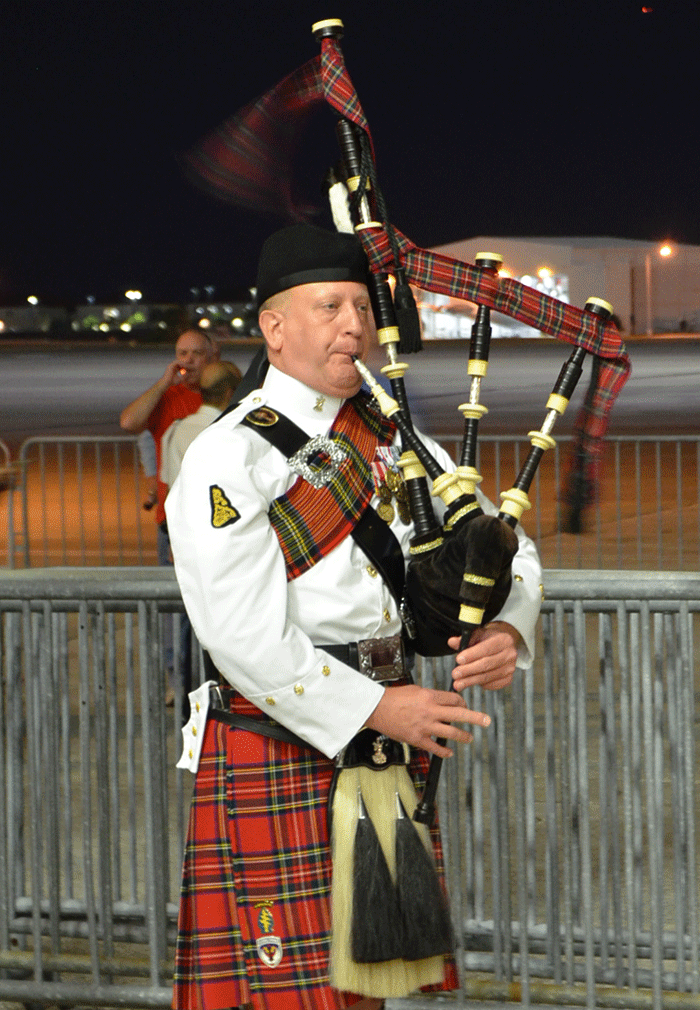
By Jeff Williams, MSG(R), Army SOF
I submit that I am a ‘nobody’ in piping or drumming. However, I think that there needs to be some serious consideration given to the fees people are charging for piping and drumming instruction.
In my humble opinion, there is a lot of ego in piping. Perhaps too much ego and this is making competent instruction impossible to obtain for the average individual.
Piping is not a hobby or passion for the average person, and that is a shame. Luckily I have had a life long passion – from the day I first heard the pipes. I then had a passion to learn. Unfortunately my parents could not afford tuition, and even if they could afford it, truly competent instruction was unavailable.
[wds id=”2″]
Perhaps these two facts may have actually saved me from greater fingering issues today. It is a genuine shame that in the land which prides itself on having the pipes as its national instrument – Scotland – that you cannot provide your own people, regardless of their financial condition, with creditable piping tuition! It is mind blowing really.
It is also a shame that those who have never marched one step of a 2/4 march at a major competition believe themselves to be fair with their students when they command £40 or even £30 an hour for a piping lesson!
As a sergeant major of mine once said, ‘Just because you can read doesn’t necessarily mean that you should be singing karaoke!’
I am no open or professional piper, but I would extend my sergeant major’s thought and say, does being a Grade 2 or B Grade, perhaps even a Grade 1 or A Grade piper, mean that you are worth £30 to £45 for one hour of tuition?
Perhaps some professional, critical re-thinking, some introspection and policing within our ranks is what is needed to tame the ego and to ensure the highest quality of instruction is available to all who aspire to learn our beloved instrument, be that in school or in private.
When something such as piping and drumming tuition becomes so expensive that it is difficult for the average adult to be able to afford it, I think you have to ask the question, have we lost touch with reality?
Does the fact that there is more demand for piping than there are legitimate, competent tutors available, warrant exorbitant fees?
I am an average adult of 50 years of age, and receive a fair income after almost 23 years of military service and a disability pension for service injuries. Yet I am about to be pushed out of piping as a soloist. It is becoming simply too expensive.
On top of lesson fees, it costs me about £200 after lodgings, meals, travel, and entry (perhaps a bit more) each time I travel by car to a games to compete as a soloist.

I am a single individual with no children to have to worry about. I can’t imagine what it would be like to have to pay school costs and the like, AND piping or drumming instruction fees in addition to day-to-day life expenses!
I wonder, has it always been proportionately this expensive? What does this tell us about the cost of piping today? What is going to be the future of piping if this continues?
Just some thoughts from an uneducated, simple man who is as passionate about the music as the next piper or drummer.
- Well, do tou agree with Jeff? What do you pay for your lessons? Let’s have your thoughts. Jeff’s bio reads: While I was attending boarding school in 1989 in New York I was fortunate to have taken my first lessons from George Kilgour, formerly Scots Guards. Shortly after my lessons with George, I ended up in the U.S. Special Operations which made it impossible to continue tuition. I was injured while in service and had to be retired in 2013. Before my retirement, doctors encouraged me to return to piping as part of my therapy and recovery. I returned to piping in 2011, Mr. Neil Clark also formerly Scots Guards, placed me back on the road to becoming a piper. Following my instruction and initial successes in piping with Neil, I have taken private lessons from P/M Iain Donaldson; P/M John Cairns among others. I am currently very fortunate to have a very senior level master piper for my instructor.

I am a current Grade 3 solo competitor and have been a member of the EUSPBA since 2012. While in the Army, I had the distinct honour of being the unofficial piper to the Commanders of U.S. Special Operations Command – Central (2002-2008) and United States Special Operations Command (2008-2013). I continue to receive requests to play for military commands, veteran’s organizations, service members, and their families. Piping continues to be a big part of my recovery from service connected injuries and a passion. I am the first of my family to be born in the U.S. and hope to become a competent piper one day and return to compete in my parent’s ancestral homelands of Scotland and Ireland.
[wds id=”2″]















I am most certainly a nobody in the world of piping and doubt that I’ll win a Gold Medal anytime between now in my 48th year and when and if I ever get to reach 60. I have been playing pipes here in New York and elsewhere around the world when on work duty for over 35 years and had over the years both free tuition and paid tuition over long periods of time from well known Gold Medalists active and retired, some of whom are currently senior judges on the Scottish and North American circuit and I am forever thankful for their time and endeavour in attempting to make me a better piper. I am now where I am because of them.
I was in the past in the late 80’s and early 90’s a Grade 1 amateur player here in EUSPBA and after a long absence from playing am now a Grade 2 with CLASP in Scotland. I have consistently have sought out the best people in Scotland, Canada and and as far away as New Zealand to help elevate my standard to the highest I could possibly achieve, I remain eternally grateful. One does not have to pay for lessons if one tries to meet the right person whom you feel might elevate your (one’s) playing who, on hearing you play and assess your keenness might very well take you into their wing. It has happened to me several times over the years and till this day they have remained my greatest of friends.
I think you’ll find that money has not much to do anything given the right approach but rather, on how one approaches it. I hope you do not despair.
I have never forgotten the late Seumas MacNeill’s words written in the preface of the ‘Good Book’ as he termed it which had always provided a tonic for me when I felt at times when my piping turned black:
‘To those who feel they are losing the battle, this book is sympathetically dedicated in the hope that they win a glorious victory.’
As an economlst, I would like to point out to Mr. Williams that we live in a market economy wherein price operates as a means of exchange to theoretically efficiently allocate scarce resources.
Having the knowledge, skill and desire to expertly teach the skills required to musically play bagpipes is not quickly developed nor in excess supply. Economic theory suggests that this expertise should be highly rewarded in the market economy. This would induce a continuing supply of such a scarce resource.
In the real world, price does not efficiently allocate scarce resources. As Mr. Williams points out, hardship and lack of means can result in exclusion and loss of opportunity for potentially talented and enthusiastic participants.
Intelligent, thoughtful and generous people have attempted to address the inefficiencies in our economic system. One dedicated example that immediately comes to mind was Seumas MacNeill who along with Tommy Pearston started The College of Piping. They attempted to provide expert instruction to any willing pupil, so that the cost of such would be no barrier to access. I would think there are many pipers today who benefitted from their inclusive, humanitarian philosophy. I am not sure that the leaders in piping instructional institutions today share that enthusiastic committment and foresight. I think Seumas paid a great personal price when he saw how great ideals were overtaken by a different perspective.
Today, it is expensive to fully participate in piping . It is not easy to obtain dedicted, long term, expert instruction. Even the experts face increasing expenses to stay at their level, so how could many offer to teach for a low fee even if they were so inclined?
Look at other areas: How easy is it to get instruction on the violin from a world class expert such as Itzak Perlman?
Mr. Williams, accomplished players today have requests from around the world. They set their fee for what the market will bear. Their instruction time is limited so they choose which workshops to participate in and which students to instruct.
Seumas once said he taught adults so that they could enjoy their own playing. That is a noble aspiration. If you are at a Gr. 3 level and wish to advance, perhaps it would benefit you to 1) allocate frequent practice sessions on yourchanter to basic finger technique so that your technique will be easy and smooth and not interfere with the musical line in your chosen repertoire, 2) listen on a daily basis to recordings by players you like and to the tunes you play , 3) expand your audience by playing in nursing homes, schools, parks, 4) do some teaching yourself, 5)record and listen to your own playing at least weekly and ask yourself if you like your music and if it flows nicely.
Since you raise concerns that expert instruction is too costly and not that readily available, do what you can to enjoy your own playing and help others who have noticed the same difficulties. I hope you can reach the higher levels to which you aspire without focussing solely on the expensive treadmill of the competitive circuit. I hope you find affordable routes to advancing your skills to a level that will give you satisfaction and pleasure.
Two schools of thought here. Firstly as an amateur who has got a lot out of pipe bands and been given excellent tuition throughout a long career, I would be reluctant to take money. I would rather give back to the hobby that has given me so much.
However for people who are looking to supplement or with teaching as their main source of income, it only seems fsir to charge a decent hourly rate. Let’s face it, go into a garage or call in a plumber and it’s £78/80 before they will open the tool box. You’re paying, not only for their expertise, but for tge hours of practice they have put in to get to their level.
Jeff, your comments really are worth saying and I’d like to add my five cents worth if I may. When I was a kid growing up in South Africa I got the piping bug. I was a nobody (still am, really) in piping with a passion being taught by others who were passionate about piping and many of whom considered themselves nobodies in piping. I was NEVER charged anything for my piping lessons as many adults at the time saw potential and hoped I’d join their bands, I guess. What I never realized until I was much older was the QUALITY of instruction I did receive.
I most certainly HEAR you on the cost of piping these days. Add to this $50 to EUSPBA just to be eligible to play (plus travel costs, hotels etc.) it quickly adds up. For this reason I don’t pay my EUSPBA fees which precludes me from competing in the Open competitions. Open competitions are so few and far between that it seems ludicrous for me to spend 1-2 hours every day memorizing thirty tunes to play 4 or 5 contests a year. There are other reasons too but that’s the financial side which you talk on.
Firstly, in defending tutors being paid, I used to have a few pupils here in Cincinnati who would INSIST on paying me although I said I did not want paying. There is the culture here, almost, that anything for free cannot be quality which is so sad. Then there is the time and effort made by certain individuals who decide to make piping a business career (many of whom, as you correctly state, are competent top level competitors themselves) these gentlemen and women have a business plan and cater to peoples schedules and demand, like teachers of ALL music, a fee. (Have you tried getting free piano lessons?)
The other thing that saddens me is that judges often ask “Who is your teacher?” as if that should make a difference. Pipers then feel it necessary to HAVE a teacher and the better the name, the more influence when you mention the name. If you play well you should be recognized even if you teach yourself and this brings me to my other point.
Does having a tutor necessarily mean you’ll be a better player? Having been taught, initially, by P/M Kilgour, you should have, instilled in your playing, a fair to strong basics especially of the light music. You should have been taught the rudiments correctly, phrasing and timing and on how to maintain your instrument and your personal playing fitness to an optimum level.
With these things in mind I would like to suggest that setting up a practice routine for yourself and challenging yourself to play as well as you can might be more effective (and rewarding in the long run) than trying to find a cheaper teacher who may, or may not, make you a better player. This is where PASSION comes into the equation.
I write and play folk music as well as my piping. I have, for as long as I remember, believed that any performance is an overall package. I am not a great singer and I am not an accomplished, classically trained guitarist. However, I believe that the package I present on stage or in someone’s home, overall, is of a reasonable and listenable quality. This motivates me to continue practicing my art. There are nowadays TONS of material on the internet to help with all aspects of performing and they are largely FREE or a few bucks. You mention Neil Clark. What a star! I would challenge you to have Neil play, for you, a March, a Strathspey and a Reel you want, a 6/8 march and H/J etc. Even the ground to a pibroch. (Or you choose from the hundreds he already has on YouTube) and then YOU challenge yourself to get those tunes off to the best of your ability.
There is only so much you can learn about how to play a 2/4 march, a strathspey or a reel etc. And once you know this, it applies to other tunes of the same time signature. Piobaireachds are a little different but I would like to be as bold as to say, perhaps not too much at grade 3 level. More importantly here is a precise knowledge of the ground and a fair presentation of a melodic tune on a well tuned instrument that makes the judge sit back and think, “This chap is really enjoying this tune”.
I am not sure where you are based but I would recommend joining a band too, if you can. The social aspect of a band can be a great motivator and also gives you more reason to travel to games if the band is competing, Joining a grade 2 band or higher can also push you to try harder and the rewards are great. However, in my case, to join a Grade 2 band or higher means EXTRA traveling to Cleveland (5 hours), Chicago (6 hours) or further afield. I laugh about this sometimes because the same problems exist in Scotland where people can’t be bothered to drive 2 hours to a games where I’d LOVE it if all the games I played were only 2 hours away!
I have rabbeted on a wee bit here but I hope it makes sense to you and I hope that it helps you change your mind regarding quitting. If you think back to the original pipers back in the day, they might not have seen or heard another piper from one year to the next!
Dear Jeff, Without doubt, your article will evoke much sympathy amongst the piping community the world over. However, we all struggle with the financial aspects of life and whatever we chose in the form of hobbies, remains our personal decision and involves a commitment to pay for it. The top rank pipers who offer tuition are no different, other than they rely on (what was at one time as hobby) piping as a source of income and the cost of living is not cheap these days. My own pupils pay £15 per hour, but then, I’m not a top flight piper, yet I can provide top flight instruction for ab initio training. I understand your point about travelling costs to attend competitions which will find an echo in many quarters. Living , as I do, about 200 miles from the central belt of Scotland, I too end up with substantial bills, for fuel, overnight accommodation, meals/drinks, etc. whenever I visit a piping event in Scotland. But the old saying “where there’s a will, there’s a way” is what I hang on to. Yes, life is expensive, but the buzz and the joy of being part of our ancient musical tradition, has for me, been worth it.
I have played the bagpipes since the age of 10 in the Highlands of Scotland. I was taught by the legendary Andrew Venters from about the age of 13. He taught me at home and never once charged me for a lesson. He has taught hundreds of people in the same manner. He was a schools tutor and got paid but that is not where i and many others were taught. Now as i approach 50 i have taught since the age of 16 and never once charged people for lessons as i was not charged. I am now one of 3 piping instructors with the city of Inverness youth pipe band which have approximately 30 pipers on their books. Neither the 3 of us charge for our time at the band and neither do the 3 drumming instructors, including the legendary Alistair Dowling.
Obviously i have a job that enables me to give my time to teach for free. I see as the years go on fees go up in the private world of teaching but piping has never been about money to me, and I’ve seen it being available to all. At present in the Highlands of Scotland piping continues to grow.